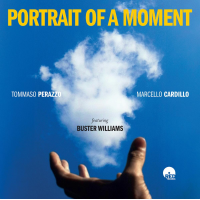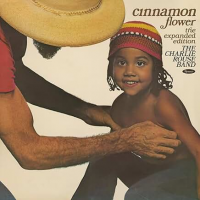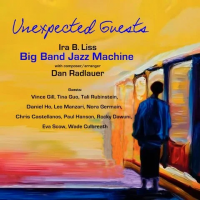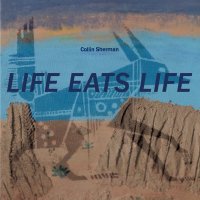Home » Jazz Articles » Extended Analysis » Bill Cunliffe: Bill Cunliffe: The Blues and the Abstract...
Bill Cunliffe: Bill Cunliffe: The Blues and the Abstract Truth, Take 2
Oliver Nelson
saxophone1932 - 1975
The Blues And The Abstract Truth boasted a superstars-in-the-1960s lineup that included pianist

Bill Evans
piano1929 - 1980

Paul Chambers
bass, acoustic1935 - 1969

Freddie Hubbard
trumpet1938 - 2008

Eric Dolphy
woodwinds1928 - 1964

Roy Haynes
drums1926 - 2024

Miles Davis
trumpet1926 - 1991
Almost 50 years since its original release, The Blues And The Abstract Truth provides pianist/arranger Bill Cunliffe an excellent vehicle for a 21st century consideration. The Blues And The Abstract Truth, Take 2 is that reconsideration. Cunliffe divides his time between New York and Los Angeles. He trained at Duke University under May Lou Williams and took his masters degree from the Eastman School of Music. He is a noted big band arranger who was won Down Beat Awards for his big band and orchestral work.
Cunliffe creatively uses his dense arsenal of arranging talents on this project. Oliver Nelson composed with a beautifully organic sophistication, Blues... being his most evolved example. Cunliffe, rather than simply replicating a masterpiece, chooses to to project this musical light through a different prism, one that is equally foward-looking and traditional.
Cunliffe retains Nelson's original song order and adds two of his own original compositions to round out the recording. (The original was 36:35 minutes with Cunliffe's clocking in at 41:00). Cunliffe's compositions, "Port Authority" and "Mary Lou's Blues," are very much in keeping with the texture of the original Blues... but extrapolate Cunliffe's future-of-jazz view. "Port Authority" has a craggy bop head that leads into a solo section in the same way the arrangements of Nelson's songs do. First Cunliffe flies through a chorus or two and then Jeff Clayton and Bob Sheppard turn in nifty alto and soprano saxophone solos respectively, followed by one from bassist Tom Warrington.
"Mary Lou's Blues" is Cunliffe's lofty homage to his teacher

Mary Lou Williams
piano1910 - 1981
Cunliffe reorchestrates Nelson's charts broadly in two ways: one, he changes the harmonic voicings of sections, giving them an almost off-kilter quality reminiscent of pianist/composer

Thelonious Monk
piano1917 - 1982
Cunliffe's takes on "Hoe Down" and "Yearnin'" are a bit more dramatic. He introduces some off-time confusion into the head of "Hoe Down," breaking up Nelson's rock-solid Aaron Copland rodeo swing bringing the horns to dissonant ends and shoring up his melody lines. Trumpeter

Terell Stafford
trumpetb.1966
The great "Yearnin'" is drastically changed from the original. Where Nelson infused a southern gospel cry into his piece, Cunliffe uses a unitarian deconstruction to add edges to the familiar climax, propelled here by Jeff Clayton's reedy alto saxophone, playing it only once in the performance. Where the jaunty head is jarring, the solo sections smooth out providing a soft cushion for the players. Stafford affords a fine building trumpet solo that absolutely burns hotter than even his solo in "Hoe Down."
As a concept disc, Bill Cunliffe's The Blues And The Abstract Truth, Take 2 ranks with the likes of Karrin Allyson's Ballads: Remembering John Coltrane (Concord, 2001) in invention and vision. Cunliffe assembles a crack outfit, somewhere between little and big band, and proceeds to record the finest disc released this year.
Tracks: Stolen Moments; Hoe Down; Cascades; Yearnin'; Butch and Butch; Teenie's Blues; Port Authority; Mary Lou's Blues.
Personnel: Bill Cunliffe: piano and arranger; Terell Stafford: guest soloist, trumpet; Jeff Clayton: guest soloist, alto sax; Andy Martin: trombone; Bob Sheppard: tenor and soprano sax; Brian Scanlon: alto sax; Larry Lunetta: trumpet; Tom Warrington: bass; Mark Ferber: drums. ">
Personnel
Bill Cunliffe
pianoAlbum information
Title: Bill Cunliffe: The Blues and the Abstract Truth, Take 2 | Year Released: 2008 | Record Label: Resonance Records
Tags
Comments
PREVIOUS / NEXT
Support All About Jazz
 All About Jazz has been a pillar of jazz since 1995, championing it as an art form and, more importantly, supporting the musicians who make it. Our enduring commitment has made "AAJ" one of the most culturally important websites of its kind, read by hundreds of thousands of fans, musicians and industry figures every month.
All About Jazz has been a pillar of jazz since 1995, championing it as an art form and, more importantly, supporting the musicians who make it. Our enduring commitment has made "AAJ" one of the most culturally important websites of its kind, read by hundreds of thousands of fans, musicians and industry figures every month.






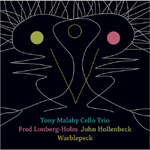

 Buy Now
Buy Now




